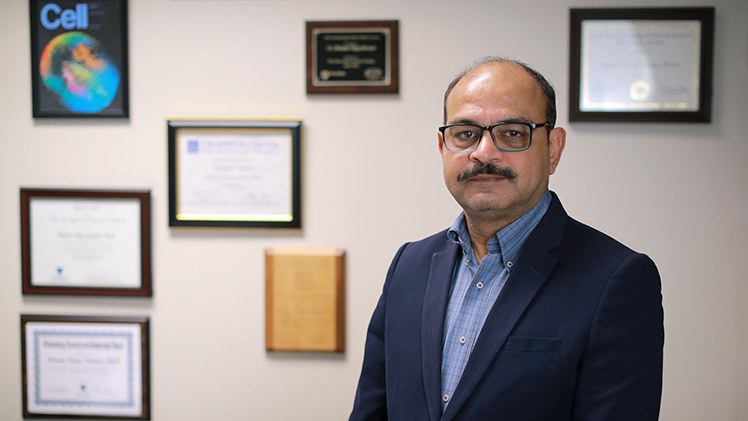Dr. Matam Vijay-Kumar has spent years accumulating laboratory evidence that suggests inulin, a popular dietary fiber supplement, may increase the risk for gastrointestinal cancers in some individuals.
Now The University of Toledo biochemist is documenting a real-world case that adds new weight to his theory on the potential carcinogenic risk of highly refined, highly processed fibers.

Dr. Matam Vijay-Kumar has spent years accumulating laboratory evidence that suggests inulin, a popular dietary fiber supplement, may increase the risk for gastrointestinal cancers in some individuals.
Dr. Vijay-Kumar, a professor in the UToledo College of Medicine and Life Sciences Department of Physiology and Pharmacology, recently detailed the case of a patient who developed metastatic colon cancer after prolonged daily consumption of inulin.
Inulin is both available as a supplement and added to highly processed, manufactured foods.
“All of our lab studies have shown the same thing — that diets rich in highly refined, fermentable fiber like inulin may increase the risk of gastrointestinal cancer,” he said. “While not a smoking gun, this patient’s story is compelling evidence that matches what we and others have seen in the lab.”
The patient detailed in the case report, published late last year in the journal Gastro Hep Advances, is in his mid 60s. The man, who is not identified by name in the article, had a clean colonoscopy at age 56 with no polyps or other abnormalities identified.
Seven years later, a routine colon cancer screening revealed a sizable malignant tumor in the start of his large intestine. Further investigation found the cancer had metastasized to his lymph nodes.
While colorectal cancer is prevalent — the World Health Organization says it leads to more than 900,000 deaths globally every year — the individual detailed in the case report had no known family history of any type of cancer, no risk factors such as obesity, tobacco or alcohol use, and reported a diet rich in organic, home-grown vegetables.
The only known lifestyle change between cancer screenings was the addition of 4 grams of inulin powder daily.
Still, Vijay-Kumar was skeptical when the man contacted him via email after reading several of his academic publications.
“My first thought was how can he pinpoint that inulin caused colon cancer? It’s incredibly difficult to identify a single cause of disease, particularly with cancer,” he said. “However, after extensive communication with him about his medical history and lifestyle, combined with what we know from studies in mice, we were convinced that there was a plausible link.”
Most of Vijay-Kumar’s work with inulin has focused on the potential risk of liver cancer. A pair of high-profile papers published in Cell in 2018 and Gastroenterology in 2022 detailed how inulin-rich diets contributed to a significant increase in liver cancer in rodents, particularly those that are intolerant to inulin and prone to liver injury upon inulin intake.
Others, inspired by the work of Vijay-Kumar and his team, have found similar evidence that inulin may promote colon cancer in rodents.
“We don’t want to scare people away from eating a high-fiber diet. There is good research showing fiber may actually reduce the risk of some types of cancer,” Vijay-Kumar said. “What we are saying is the type of fiber matters, and you’re much better off getting your fiber naturally through whole foods versus highly refined processed fibers, like inulin.”
The patient described by Vijay-Kumar experienced significant gas and bloating after consuming the inulin supplement, but continued using it believing that was a sign it was working as intended. Vijay-Kumar theorizes the cancer could have developed from an existing, undetected polyp that was affected by the patient’s now-disrupted gut bacteria expressing tumor-promoting metabolites.
The patient continues to undergo chemotherapy treatment.
While it’s not possible to say with any certainty that inulin directly caused the man’s cancer, Vijay-Kumar said the paper highlights the possibility that the connection between inulin supplements and a higher risk of cancer seen in laboratory mice may extend to some people.
“This further suggests a need for more investigation of the potential negative effects of purified, fermentable fiber,” he said. “It also strengthens the argument that people should be more cautious of adding highly purified supplements into their diet without understanding what they’re taking and speaking to their healthcare provider.”